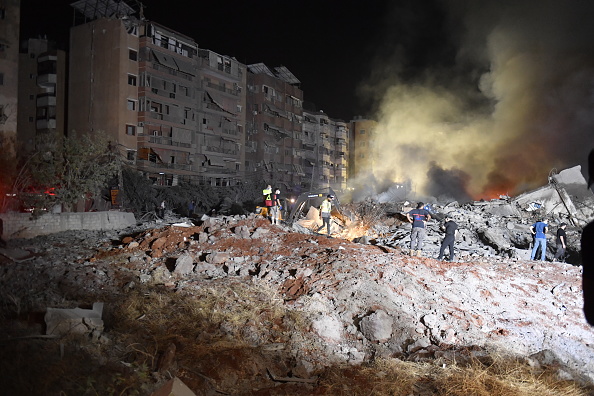
Israel’s military spokesperson declined to comment on speculation that the airstrike on south Beirut may have used US-made Mark 84 heavy bombs.
Israeli air force carried out a major strike on Beirut on Friday which caused at least 4 building blocks to collapse [GETTY]
Israel carried out its deadly strike against Hezbollah leader Hassan Nasrallah after learning he would be meeting senior commanders in the movement’s underground headquarters in southern Beirut, the Israeli military said on Saturday.
The strike, shortly after Prime Minister Benjamin Netanyahu told the United Nations General Assembly in New York that Israel would not accept Hezbollah’s forces on its borders, followed the assassination of some of the group’s most senior leaders over recent weeks.
Israeli military spokesperson, Lieutenant Colonel Nadav Shoshani said the operation, which the military called “New Order”, occurred on Friday while Nasrallah and the Hezbollah senior chain of command were meeting to plan further attacks against Israel.
“We had real time intelligence, an opportunity, an operational opportunity that allowed us to carry out this attack,” he told reporters.
Israel’s Army Radio quoted the head of the air force squadron that conducted the attack as saying the pilots were only given details of the target a short time before taking off.
“The pilots did not know what the target was in the days the (strike) was being planned,” the officer, identified only as Lieutenant Colonel M., was quoted as saying.
“We exposed the teams to the target only a few hours before carrying it out and they understood what they were going for.”
Shoshani declined to comment on speculation that the strike may have used US-made Mark 84 heavy bombs, but Brigadier General Amichai Levin, commander of Hatzerim air base, told reporters that dozens of munitions hit the target within seconds.
Ali Karaki, the head of Hezbollah’s southern front, whom Israel tried to kill earlier in the week, was also killed in the raid, Shoshani said.
Hezbollah, which launched its first barrages a day after the Hamas attack on Israel on Oct. 7 last year, confirmed Nasrallah’s death and said it would continue its battle against Israel “in support of Gaza and Palestine, and in defence of Lebanon”.
Since then, the two sides have been exchanging daily missile and rocket fire, forcing tens of thousands of people on both sides of the border to evacuate and leaving wide areas virtually deserted.
The tensions have escalated sharply in recent weeks as Israel began systematically assassinating some of Hezbollah’s top military leadership in a deliberate strategy of weakening its ability to operate.
“We’ve been gathering intelligence on Nasrallah for a few years. For decades we’ve been gathering intelligence, understanding sometime he will try and initiate a war,” he said.
“We had real time information and we carried out the strike.”
(Reuters)










